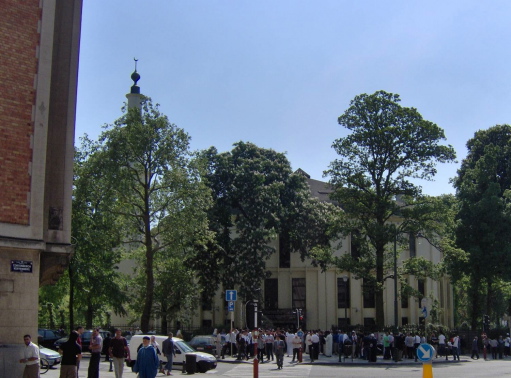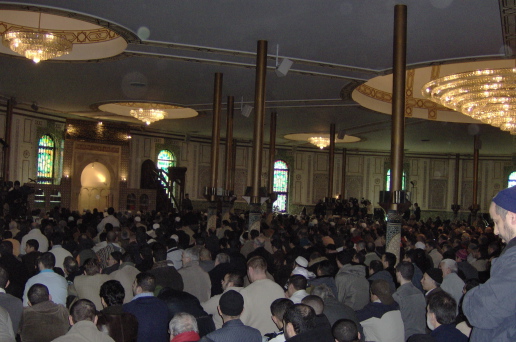
Oriental ornaments combine well with the modern architecture of the Moroccan snack “Saveurs d’Orient” in the heart of Brussels.
Inside, the smell of Moroccan orange-flower water mingles under that of freshly-backed croissants.
Housna’s pride of her family-run snack overwhelms any material interests, and she insists on me to accept having some Moroccan tea with her in a calm corner, served in an elegant teapot with finely ornamented glasses.
As she pours me the second cup, the 24 year-old granddaughter of immigrant struggles to define me her identity. “I feel like a free electron,” she says, referring to the diversity of her friends that range moderate Muslims like herself, fundamentalist Muslims and people of other confessions. “I can’t find a community that totally represents me; I stay on the crossroads, open to everyone.”
Housna is part of the growing Belgian Muslim community of about 400,000 persons, the largest religious minority in the country which hosts the EU headquarters.
Belgium’s national statistics have revealed that “Mohammed” is the most popular first name chosen for new-born in the capital Brussels. Political scientist Corinne Torrekens, who carried out a research on Muslims in Brussels, has concluded that, with an estimate 160,000 Muslims, that is, 17% of its total population, Brussels has become “one of the most Muslim cities in the Western world”.
In the Muslim World League-funded Islamic and Cultural Center of Belgium, often called the ‘Great Mosque of Brussels’, which is situated near the Schuman round-about where the EU headquarters are based, the community’s growth has been felt most remarkably.
Its foundation in 1968 was the initiative of Saudi Arabia’s then King Faysal, who was offered the oriental pavilion in the Cinquantenaire park by the then Belgian King Baudoin.
While in the 70s, only two lines of the huge prayer hall were filled in the best cases, the mosque today has to be widened with tents that are pitched around the building in peak seasons like Ramadan and the two Muslim festivities. The number of people who attended last Ramadan’s night prayers is assessed at 7000.
Muslims’ demography
Torrekens’ research also takes into account the ethnic diversity of the city’s Muslims, saying, “More than 70% of Muslims in Brussels are Moroccans or of Moroccan origin, 20% are Turkish or of Turkish origin, and the remaining 10% represent Albanians, Pakistanis, Egyptians and other North African nationalities or origins – Tunisia, Algeria, etc.”
The Muslims’ presence in Brussels remains quite disproportionate, with 75% of them living in only five of the Brussels-Capital Region’s 19 municipal districts, Anderlecht, Brussels-Centre, Molenbeek, Schaerbeek and Saint-Josse.
Torrekens relates this fact to several factors. “The concentration of the Muslim population stems first from the history of migration itself,” she says. “The immigrant workers initially settled near their place of work.”
Another factor is the city’s social-spatial and residential structure. “They moved into affordable, working class urban residential areas. And it so happens that in Brussels these neighbourhoods are in the center.” This was followed by a gradual abandonment by the upper classes and by part of the working class who could afford it. But “a very large majority of Muslim families belonged to categories of the population whose more precarious social-economic conditions blocked any possibility of spatial mobility”.
Even institutions like banks, post offices and insurances have abandoned the areas, leaving behind what many call ghettos. This process has had a negative impact on education as explains Mr. Pierre Laurant, head teacher of a Molenbeek-based secondary school, and who promotes a multicultural society.
“The more different cultures are mingled in one class, the easier it is for a teacher to deliver a lecture,” he says after 30 years of experience. The example he provides is that, if a class if made up of two different cultures, say, Moroccans and Polish, the students tend to divide into two conflicting groups, which does not appear when pupils of a wider cultural diversity are mixed.
Social challenges: identity vs integration
The second and third generations of Muslims have marked a participation in Belgian politics – many occupy seats in the Belgian parliament, as well as in the local governmental bodies, especially in those municipal districts where many Muslims live in large numbers. Fadila Laan, a 30 year-old daughter of a Moroccan immigrant who was born in Brussels, is the Belgian Minister of culture and audiovisual.
But the community is still at an immature stage, the challenge raising their most serious concern being the high crime rates among Muslim youth.
While the issue is easily interpreted as related to Islam, people like Housna stress that the reason is economical, because the majority of Muslims stem from unfavoured social classes.
But secondary school teacher Omar, a 45 year-old Muslim of German origin, suggests another analysis. “If it had to do with economical factors, then the problem would be too much money,” he says, referring, for instance, to unemployment money. “Many just feel too secure here that they don’t bother studying anymore.
“I believe the crime rates among the Muslim youth are rather a consequence to the wide gap between their world at home and life at school.”
In front of what Omar calls a conflict between two worlds, the majority of Muslims have tended towards one of the poles, while few have succeeded in finding a balance where they preserve their identity while living in conformity with the Belgian environment.
Bridging these two worlds is just what Brussels’ only Islamic school Al-Ghazali intends to do. Situated in the Islamic Center’s precincts, this kindergarten- and primary-school differs from others by “offering Muslim children the opportunity to get a Belgian education in a Muslim ambiance”, says the school’s head teacher, Mrs Claire Dupuis, a Belgian-turned-Muslim.
But with only 226 seats available, it is a drop in an ocean. When founded in 1989, it was decided that the school provisionally stay in the Islamic Center’s precincts until a more spacious building was found. The situation remains unchanged today, 19 years later.
Mrs Dupuis relates the problem to the difficulty of finding a convenient building, and the integration policy followed by some local governments such as the municipal district of Molenbeek, home to the largest number of Muslims. A Muslim school would go against a policy aiming at creating a multicultural society, it is said.
But Mrs Dupuis argues that her school by no means isolates the children from other cultures. “Our educators care to develop the children’s tolerance and respect towards others – that’s one of Islam’s messages,” she says. “In no way do we differ from any Catholic school.”
Although a multicultural society can be helpful in educational institutions, as head teacher Pierre Laurant claims, the Belgian integration approach has become controversial, since many claim it denies them their cultural and religious identities.
Prohibiting the Muslim veil, for instance, as the majority of schools do as part of banning the wear of religious signs, is seen by Muslim girls as a breach into their very identity.
It even moves Housna whose appearance does not show any religious symbol, the veil not being part of her priorities. “I have no intention to wear it,” she says, “but as soon as I see someone prevented from wearing it, I want to revolt.”
Comparing the Belgian situation to that of England, where the government has a more open approach towards Muslims as reflected by its close cooperation with institutions run by Muslims such as the Islamic Foundation in Leicester, many Muslims find the Belgian integration policy counter-productive.
Coskun Beyazgül, who heads the Exécutif des Musulmans de Belgique (EMB), the official body representing Muslims, puts it in this way: “The integration approach is ineffective because it tends to get confused with people’s cultures; there needs to be a complementarity from both sides. Integration should not deny people’s religion and origin. After all, most Muslims are born in Belgium.”

Political issues
On the political arena, the relation between the Belgian government and the Muslim community has recently improved after long, controversial years that have left some suspicious about the political will to further discussion as far as Islam is concerned.
The Islamic faith was officially recognized by the Belgian government in 1974 along with four other beliefs (Catholicism, Protestantism, Anglicanism and Judaism). Two faiths followed (Orthodox faith in 1985 and Secular Humanism in 1993).
Islam’s recognition was followed, in 1975, by the introduction of the Islamic religion as an optional branch in state schools and a state take-over of the remuneration for the branch’s teachers.
The Muslim World League-funded Islamic and Cultural Center acted as interlocutor between the Muslim community and the Belgian government until the Exécutif (EMB) was founded in 1997.
Belgium is a secular state, which means that all recognized religions have equal rights, including funding of their institutions’ expenses.
The EMB’s Beyazgül says he intends to “concretize Islam’s recognition through a state funding for the religion (the Imams’ salaries, for instance) as it is the case with the five other religions”, adding, “Islam still doesn’t enjoy the same chances as the other faiths.”
The beliefs’ funding is a federal competence assumed by the Ministry of Justice, which announced a Euro 5 Million budget for the Muslim faith in 2007, according to Mr Ghysselinckx, an Advisor at the Justice Ministry. The funding can start when the institutions are recognized by each of Belgium’s three regional governments (the Flemish Region in the North, the Wallon Region in the South and the Brussels-Capital Region in the center).
The process seems to have gained speed in the recent months, with 43 mosques recognized by the Wallon government in June 2007 and five recognized by Brussels in December 2007. (The country counts around 350 mosques in total.)
But as the course lasted more than 30 years, each side was rebuked by the other. While the Government blamed the Muslims for failing to unify, the Belgian-turned-Muslim, Professor Yahya Michot, who now lectures in the Oxford Center for Islamic Studies, and who headed the Higher Council of Muslims, a previous version of the Exécutif which was not recognized by the Belgian Government, said “There is no political will to further the discussions. Islam’s recognition remains a fiction.”
But it seems that both sides had a hand in the process’ slow pace. Noé Martens, attaché of the cabinet of Brussels Region’s Minister President Charles Picqué, says the recent recognition of five Brussels mosques is the result of “the new government’s will to stop the discrimination of the Muslim belief, as well as an efficient management inside the EMB”.
Such initiatives by the Belgian government are welcomed by Belgian Muslims who, over generations, become so closely attached to Belgium that they perceive it as their home more than their country of origin.
While Housna’s grandfather always spoke of returning to Morocco one day, her parents see it as a place to spend two months of holidays a year. Housna, of the third generation, even thinks about 400 Euro holiday packages in Turkey. The part of the world where she feels at home is her Brussels “Saveurs d’Orient”.
Asma Hanif
© 2008 Asma Hanif (article and pictures).